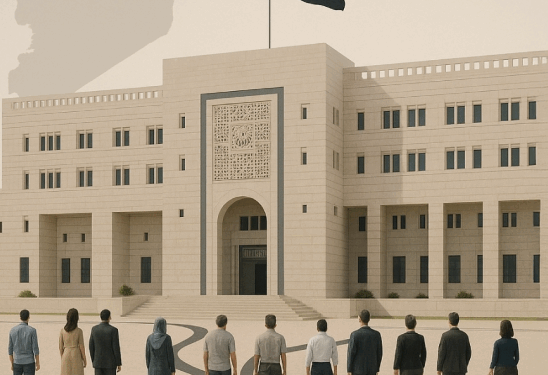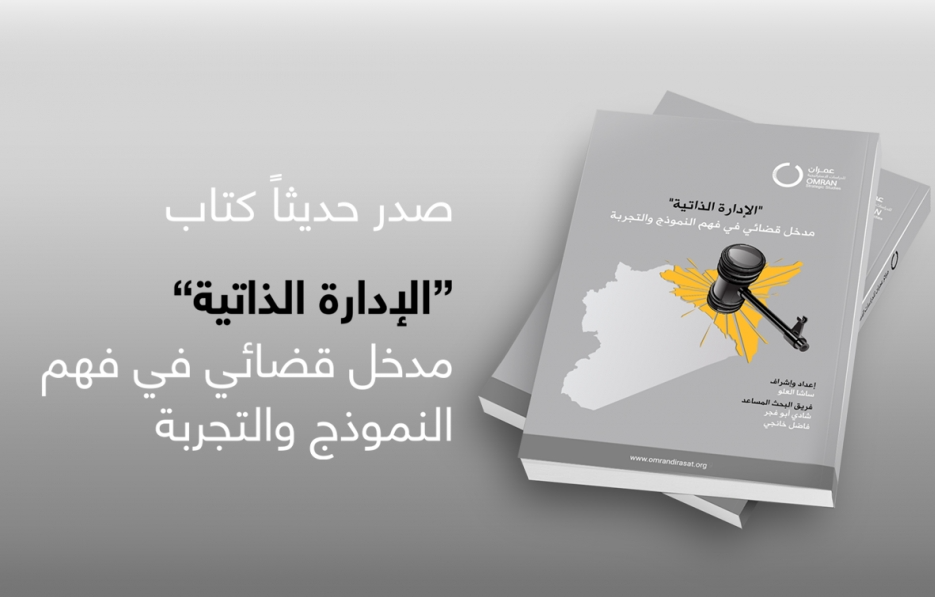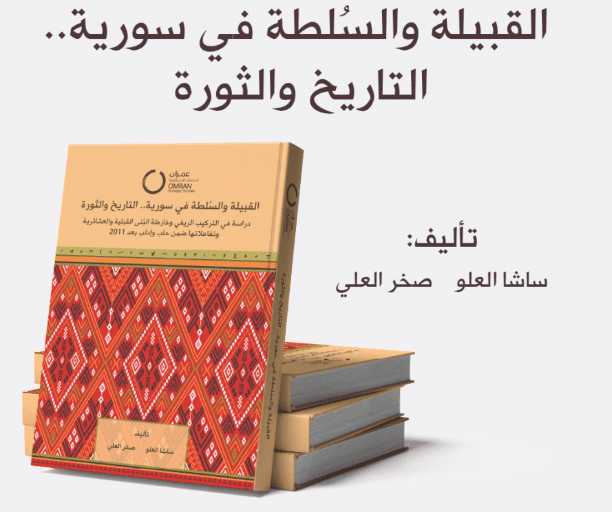Introduction
The term of the Syrian caretaker government, formed in December 2024, has ended, making way for a new transitional government formed to complete the arrangements for managing the post-Assad era. The government’s stability remains fragile amidst a state of uncertainty and ambiguity that imposes itself on the reality and future, and their perceptions. This uncertainty ranges between the possibility of stability and development with varying margins of participation, or the possibility of instability with the return of violence in various forms, and the potential consequences and outcomes in between for the cohesion of the Syrian state and its territorial integrity.
The new transitional government faces major political challenges, including those related to the internal situation, with all its complexities and local contexts linked to the heavy legacy of the former regime, a long history of political isolation, and the exploitation of the state apparatus to protect power. This has resulted in a distorted relationship between the state and society, with its various components. This is compounded by high domestic political expectations, particularly from the revolutionary crowd, which links this ceiling to the enormous cost it has incurred over the past 14 years. This is in addition to the expectations of change awaited by all social and political groups and components. This presents the new government with complex challenges, foremost among which is building internal political legitimacy for the existing government by completing and overcoming sensitive national obligations, restructuring state institutions, relaunching the economy, and maintaining security, stability, and unity.
On another level, foreign policy poses challenges no less serious than the internal situation, especially amid an unstable and evolving regional security system, and the expectations and demands of international and regional powers with conflicting interests, some of which remain directly active on the ground and in the Syrian skies. In this context, problematic challenges arise, with the question of what international and regional powers want from the new Syrian government taking precedence over the question of what the Syrian government itself wants. This is especially true given the divergent demands of some powers, linked to two important issues: the first concerns Syria’s geopolitical role in the region, and the second concerns the nature of the new administration that has come to power, led by Hay’at Tahrir al-Sham (HTS), and the accompanying concerns, fears, and expectations of change.
The new transitional government faces a real test in dealing with the magnitude of the complex challenges. This test will determine the extent of success or failure in the short and medium term. It requires the government to identify the central priorities it must address, and to adopt policies that address national demands flexibly, efficiently, effectively, and collaboratively. This push will also stimulate the dynamics of stability and unity at the expense of the dynamics of violence and fragmentation. Accordingly, this paper seeks to review and deconstruct the most prominent complex challenges awaiting the new transitional government at the political, security, economic, social, and governance levels. It discusses and analyzes them within the local, regional, and international context, with its intertwined data, conditional opportunities, and cautious stakes. The paper then presents comprehensive proposals and policies for addressing each level of challenges, based on current circumstances, data, and available tools.
Political Challenges (Legitimacy and Repositioning)
The new transitional government faces major political challenges at both the domestic and external levels. The political landscape is becoming increasingly complex with the overlap and mutual influence of the two aforementioned levels, increasing the level of risks and difficulties and requiring flexible and realistic mechanisms and approaches to address them. The most prominent challenges in this context are distributed as follows:
External Level: Intertwined Interests and Conditional Opportunities
Syria faces a fundamental challenge: redefining its geopolitical role and repositioning itself within the emerging regional political-security order, which is witnessing the decline of Iranian influence and the decline of the “resistance” axis. This intersects with the containment and targeting of sub-state actors/militias in the region (Lebanon, Palestine, Syria, Iraq, Sudan), while regional and international attempts to fill the resulting vacuum, or even exploit the circumstances to impose a new political-security reality by force, similar to Israeli policy in the region in general and Syria in particular.
Amid these complexities, the new Syrian government faces the challenge of redrawing its new regional and international alliances in a manner that achieves greater legitimacy and political-security stability and ensures the ability to confront greater challenges in the future, while preserving the independence of Syrian decision-making and achieving effective and sustainable integration into the Arab and international system. However, establishing this equation does not seem easy, whether it relates to the region and surrounding countries in particular, or to other international powers with conflicting interests in Syria. As much as the new government appears to be taking firm steps toward the Arab world (the axis of moderation), and cautious steps toward Moscow in favor of moving closer to the Western-NATO axis (the United States, Europe, and Turkey), it is simultaneously still trying to manage the balance of power regarding foreign relations and their requirements among the various powers. This appears to be a risky bet in a sensitive context, with fragile and incomplete alliances and a newly formed authority.
Regarding relations with Turkey, managing them in a balanced manner is a pivotal challenge. Ankara has clear interests in preventing the establishment of an independent entity in northeastern Syria and in controlling the security of its borders. It also aspires to a significant economic role and political influence in Syria. While the new Syrian government needs Turkey as a regional backer and strategic ally amid security and military threats, there are several Arab concerns about the scope and nature of this alliance. Despite the intersection of the interests of Arab powers with Turkish strategic interests in Syria, most notably limiting Iranian influence and curbing Israeli interference, and despite the fact that Arab-Turkish relations within the current regional context appear less tense and more coordinated than they appeared in 2015 (when the Syrian file was managed through competition), some Arab powers still have concerns about Ankara’s potential influence on Syrian decision-making and the expansion of its influence in the region through Syria. On the other hand, the obsession with the Turkish role is not limited to the Arabs alone, but extends to Israel, which views the Turkish military presence in Syria, through the establishment of new bases, as a threat to its national security. In this context, it appears to prefer Moscow to remain a powerful counterweight in Syria. This contrasts with the Europeans, who are trying to achieve several interests, most notably limiting Russian influence to its maximum extent. Between them, the margin of maneuver appears narrower for Moscow, which has lost its most important allies and tools in Syria, while cautiously awaiting the final results of its negotiations with the West, led by the United States under Trump, regarding its war in Ukraine, the form of a potential settlement, and its implications for Russia’s position and alliances in the international and regional order. At the same time, Moscow is attempting to balance its relationship with the new Syrian government and create clear margins for maneuver with the West, particularly the Europeans. The Syrian administration is aware of this, and is seeking to exploit these margins and open new ones, such as restoring relations with China. It recognizes that these margins can be used for economic, developmental, and security purposes that contribute to strengthening stability and creating room for maneuver in negotiations with the West, rather than being drawn into the polarization of international and regional actors, which poses the risks of polarization in these sensitive circumstances. The Israeli threat today represents one of the most prominent complex challenges facing the new government, especially after the ground incursion, the control of strategic points, and the attempts to infiltrate socially and intelligence-wise. The challenge also lies in the current far-right government’s view of the new Syrian administration, its fear of a repeat of the October 7 scenario on its northeastern border, and its direct reliance on self-deterrence and ground and air incursions. This is aided by the collapse of the old regime and the lack of a strong central authority yet to emerge. In addition, it relies on the current government’s failure in the short and medium term, which will create a greater chance of chaos and prevent the formation of a strong central government on its borders, ensuring greater influence in southern Syria, and possibly increasing pressure in the future to ensure the reformulation of political-strategic agreements in its favor in a manner consistent with the Arab normalization processes of recent years. Its internal repercussions will be no less dangerous than its external repercussions.
On the other hand, building external legitimacy and lifting international sanctions represent one of the most important challenges in the short and medium term, with the West (Europe and America) as its gateway, along with the interests and demands of both sides. While the United States has achieved most of its declared interests after reducing Iranian influence and eliminating ISIS, ensuring these and other interests on a sustainable basis appears to be the primary goal of the new US administration. This is particularly true given that it currently views the Syrian issue within the framework of a broader regional strategy to “combat terrorism” and ensure the security of its allies, especially Israel, especially in the event of its withdrawal from Syria. It also aims to ensure that the vacuum is filled in a manner that does not destabilize the region.
In this context, Washington is setting several conditions and requirements for the new Syrian government, ranging from its regional and international positioning to the structure of the existing authority, its composition, and its orientations. In this context, it does not object to encouraging regional cooperation among neighboring countries through the framework of combating terrorism (Turkey, Jordan, Iraq, Lebanon, and Syria) in preparation for filling the vacuum resulting from a potential US troop withdrawal and ensuring that Syria does not once again become a hub for extremist groups that threaten regional and international security. As for European demands, some of them are aligned with the American orbit, while others diverge from it, particularly with regard to ending the Russian presence in Syria. They are also more closely tied to making clear and tangible changes to the form and policies of the new government, in accordance with Western standards, as a condition for lifting sanctions. This poses major challenges for the latter, putting it to a serious test of its ability to gain the trust of the international community and convince the United States and Europeans to complete the lifting of sanctions without making major concessions that could undermine its internal cohesion.
In light of these intertwined interests, the most prominent challenge facing the Syrian transitional government is transforming and transforming Syria from an arena for conflicting regional and international interests into one for building consensus and converging interests. This will ensure and protect stability and spare foreign policy the game of balance within regional and international axes and the resulting polarization. This approach appears to be a dangerous gamble in a sensitive context, with fragile and incomplete alliances and a newly formed authority.
Domestic Level: Critical Issues and Questions
Domestic politics cannot be separated from foreign policy. The demands of regional and international players will cast a shadow over the country’s domestic political interaction. Establishing and strengthening domestic political legitimacy will serve as a political shield for dealing with external challenges. This requires engaging with domestic issues and challenges with seriousness, openness, flexibility, and partnership, without diminishing their importance at the expense of their external counterparts, as has happened in the past few months following liberation.
The fall of the political system necessarily means the demise of a political era, with its system, culture, and political identity. This requires the emergence of a new system, culture, and political identity for the state. In this sense, the question of the constitution, whose functions include defining the form of the political system and the related relationship between society and the state and oversight checks and balances, is essentially political and legal in its implications. This question will be the most prominent challenge that will strengthen or undermine the transitional government’s domestic political legitimacy, especially after the recent controversy over the Constitutional Declaration, its general outlines, and its ambiguous details. Therefore, addressing key political issues, foremost among them the constitution, and completing the restructuring of institutions, including the People’s Assembly, is a top priority.
At the same time, the need for transitional justice has become more urgent, especially after the violent events on the Syrian coast. Ensuring the establishment of a transitional justice process will guarantee civil peace and be one of the pillars of strengthening the state’s legitimacy. This requires creating a neutral and professional legal environment (a judicial system) that enjoys social credibility. This is essential not only for the transitional justice process, but also for various upcoming issues, including elections and reconstruction.
Building a political system is not limited to restructuring institutions, controlling the powers (executive, legislative, and judicial), and the nature of their functional work. It also includes reshaping the political identity and culture, which represent a fundamental pillar of the state and political system and determine the determinants of the interaction of individuals and groups with them. Replacing Arab nationalism, in its Ba’athist form, based on the narrative of the March 8, 1963, “revolution,” with a Syrian national identity grounded in the narrative of a popular revolution in 2011 represents a redefinition of the state’s identity. This must be done carefully, establishing a new Syrian identity that takes into account diversity and does not overlook the Arab dimension as an important link, with its cultural rather than ideological manifestations, in a religiously and ethnically diverse country. At the same time, the revolutionary and Islamic elements in the narrative and identity of the evolving political system should not be transformed into a tool for political exclusion and isolation, thereby creating new grievances and potential risks. Rather, they should be a tool for contributing to the construction of an inclusive national identity that paves the way for broad participation and a more flexible and open political environment. In this context, the question of the boundaries of the public political space, which must balance the preservation of freedoms and the maintenance of security, also arises. This challenge will not be easy in a country that has suffered for decades from brutal tyranny, paid a heavy price for its removal, and produced hundreds of politicized groups and organizations seeking to engage with public affairs. This regime continues to face numerous risks and threats.
Conversely, although the Constitutional Declaration has opened the way for the formation of political parties, its implementation on the ground will be governed by the Political Parties Law, which is expected to be enacted by the next People’s Assembly. This law is one of the requirements that will shape the political life of the country. However, the political parties issue is not a political issue isolated from security. It will not be possible to translate security agreements with the SDF or Sweida without transforming them into solid political agreements. This intertwines with the achievement of a genuine social contract with various components and the shift of competition from the military-ideological arena to the political arena through the parties, in an integrated manner with the state’s monopoly on arms. A transition that would ensure the preservation of the state’s national security and the preservation of political freedoms at the same time.
Within the context of discussing internal challenges, the challenge facing Hay’at Tahrir al-Sham itself cannot be ignored. For Hay’at Tahrir al-Sham, the current phase is also a transitional phase undergoing testing (internally and externally) in a series of transformations. This requires it to implement the state narrative it has adopted and promoted, without exclusion or isolation, and to recognize that participation in this framework constitutes a protective shield rather than a threat. This is not to mention the political challenges it awaits regarding determining the political-party form it will take in the future, and the production of a new discourse that aligns with the aspirations of the revolution and the requirements of the state, bringing about a real transformation in structure and thought, not limited to the leading elite but rather reaching the grassroots.












